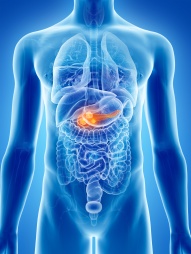 Pancreatic cancer affects as many as 5,000 Canadians each year and is one of the deadliest forms of cancer that an individual can be diagnosed with. Because of the way in which the pancreas is positioned in the body (deep in the abdomen and in front of the spine), symptoms of pancreatic cancer will often be silent until the cancer itself has metastasized, which makes it a difficult cancer to treat.
Pancreatic cancer affects as many as 5,000 Canadians each year and is one of the deadliest forms of cancer that an individual can be diagnosed with. Because of the way in which the pancreas is positioned in the body (deep in the abdomen and in front of the spine), symptoms of pancreatic cancer will often be silent until the cancer itself has metastasized, which makes it a difficult cancer to treat.
Once the cancer has metastasized, signs and symptoms that a patient might experience include abdominal pain that radiates to the back, lack of appetite, weight loss that is unintended, fatigue, and jaundice (yellowing of the skin). With pancreatic cancer it is also not uncommon to develop a new-onset of diabetes, blood clots, and even depression. As many other health conditions can cause similar symptoms, it is still important to book an appointment with your family doctor. If your family doctor is unavailable, Dr. Ali Ghahary welcomes walk-in patients at Brentwood Medical Clinic in Burnaby.
While survival rates of pancreatic cancer have increased over the years, it is still considered to be a form of cancer that is predominantly incurable. Currently, the one-year survival rate of patients diagnosed with pancreatic cancer is 20%, while the five-year survival rate is just 7%.
In order to diagnose pancreatic cancer, your physician may order a blood test. Blood testing can check the levels of certain proteins in your blood. If these are elevated, it may be an indicator of pancreatic cancer. Imaging tests such as CT scans, MRI’s and ultrasounds may also be used, and a biopsy may also need to be performed in order to further test certain cells and tissus.
There is no definitive way to stop a patient from being diagnosed with pancreatic cancer. However, there are certain preventative measures a patient can take in order to help prevent and lower their risk of developing pancreatic cancer in the future, such as making certain lifestyle changes.
One of the biggest causes of pancreatic cancer is smoking. Quitting smoking can significantly lessen the risk of pancreatic cancer, and it can also have a positive impact on many other aspects of your health. For some helpful information on smoking cessation, visit Dr. Ali Ghahary’s article on Medium.com.
It’s also important to stay at a healthy weight. Individuals who are obese are at an increased risk of developing pancreatic cancer, although it can still affect individuals of all shapes and sizes and is a type of cancer that does not discriminate one way or the other. Dr. Ali Ghahary shares insightful tips on the importance of healthy eating, and even recommends specific low-carb diets, which you can read more about on his blog on WordPress.com.
Lastly, limit alcohol intake. Heavy consumption of alcohol can lead to cirrhosis – a degenerative disease of the liver, which can increase the risk of pancreatic cancer.

